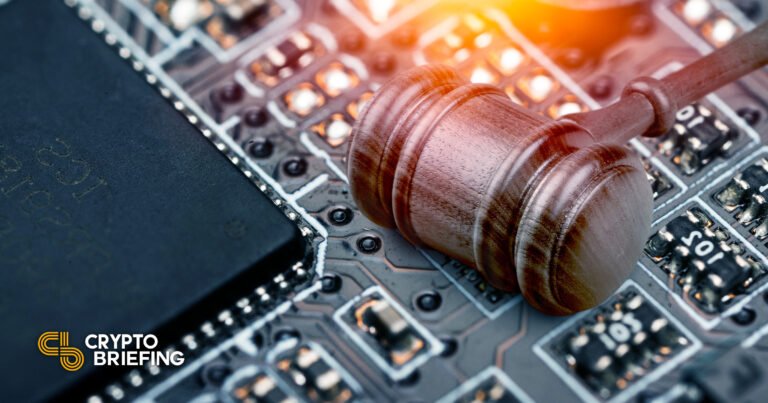U.S. Regulators Are Coming for Crypto. How Will the Future Look?

Key Takeaways
- A number of just lately proposed payments and ongoing enforcement instances may outline crypto business’s future within the U.S.
- If the SEC and CFTC win their ongoing crypto lawsuits, they might set a horrible precedent for decentralized finance and the broader business.
- Nonetheless, if the regulatory companies lose, crypto may get pleasure from a renaissance.
Share this text
The U.S. authorities’s method to crypto regulation will decide whether or not the business evolves to flourish or flounders into obscurity.
The U.S. Crypto Regulatory Panorama
Crypto regulation is coming to the U.S.—and it’s more likely to have a significant influence on the way forward for the business.
The primary key distinction to think about when analyzing the present state of play of crypto’s regulatory panorama within the U.S. is the distinction between the federal government’s legislative and enforcement approaches. That is akin to evaluating what the federal government says to what it does in observe, which is essential as a result of the distinction between the 2 approaches gives worthwhile perception into the federal government’s true intentions regarding the business and asset class.
On the legislative entrance, there was a big enhance in crypto-related invoice proposals during the last yr, together with Senators Cynthia Lummis and Kirsten Gillibrand’s Responsible Financial Innovation Act, Consultant Josh Gottheimer’s Stablecoin Innovation and Protection Act of 2022, Senator Pat Toomey’s Stablecoin TRUST Act of 2022, and Senators Debbie Stabenow and John Boozman’s Digital Commodities Consumer Protection Act of 2022. If these payments come to move as proposed, the crypto regulatory and business panorama will see important modifications, most of which business stakeholders have valued as constructive.
Maybe most notably, the Commodity Futures Buying and selling Fee would take priority away from the Securities and Alternate Fee in turning into the first regulator of the asset class by gaining authority over cryptocurrency spot and derivatives markets. Till just lately, this was thought of a extremely welcomed change amongst business stakeholders who’ve develop into fed up with the SEC’s aggressive “regulation by enforcement ” method.
One other main change that may observe if these payments handed could be the introduction of considerably extra stringent guidelines for issuing and managing stablecoins. This might result in an implicit prohibition of unbacked, algorithmic, or “endogenously collateralized” stablecoins and 100% reserve necessities for stablecoin issuers. Stablecoin issuers will seemingly be required to personal financial institution charters, that are very tough to accumulate, or register immediately with the Federal Reserve. This might considerably cut back depeg dangers inside the cryptocurrency market. Nonetheless, it may additionally centralize the on-chain economic system if the house turns into too reliant on regulated stablecoin suppliers.
Nonetheless, maybe crucial growth on the legislative entrance is the White Home’s current complete framework for regulating the digital property house. The framework was revealed on September 16 after President Biden signed an govt order on “Ensuring Responsible Development of Digital Assets” in March. It contains the views and proposals of the SEC, the Treasury Division, and a number of different authorities companies on methods to regulate crypto property.
The framework gives the clearest overview thus far of how the Biden Administration plans to cope with crypto, together with plans to ramp up enforcement actions in opposition to unlawful practices, pushing customers away from crypto and towards government-issued and managed centralized cost options like FedNow and CBDCs, amending the Financial institution Secrecy Act to use explicitly to digital property, and leveraging the nation’s standing in worldwide organizations to advertise larger cross-border cooperation on crypto regulation and enforcement.
If the administration begins delivering on its plans, the U.S. crypto business will begin trying more and more extra like fintech than the grassroots motion in search of to create another monetary system it got down to be. By implementing excessively stringent regulatory necessities on the business, its stakeholders may begin leaving the U.S. for extra crypto-friendly jurisdictions, resulting in an exodus of Web3 expertise and finally America’s subservience on the worldwide crypto scene.
Regulation By means of Enforcement
On the enforcement entrance, there are a number of crucial ongoing instances that—relying on their final result—may reshape the cryptocurrency panorama within the nation. Essentially the most broadly documented of those instances is the SEC v. Ripple, during which the securities company is suing the blockchain firm for allegedly conducting an unlawful safety providing by publicly promoting XRP tokens. Judging by the case’s newest developments, the matter will seemingly be settled out of court docket, which might be a significant win for each Ripple and the U.S. crypto business. For the securities company, shedding the case or settling out of court docket would make it a lot more durable to pursue different crypto corporations on the identical costs, giving crypto issuers and exchanges much-needed respiration room.
The second crucial case is SEC v. Wahi, the place the securities company is suing a former Coinbase worker and two co-conspirators on insider buying and selling costs. In a flagrant instance of “regulation by enforcement,” the SEC argues that “a minimum of” 9 of the cryptocurrencies listed on the alternate had been securities. If accepted by the court docket, this declare may have broad implications within the business by making it simpler for the company to pursue crypto exchanges for illegally providing unregistered securities.
In one other ongoing case highlighting the SEC’s “regulation by enforcement” method, the company is attempting to ascertain its maintain over the business by making broad claims that would have extreme implications for the asset class. Particularly, within the SEC v. Ian Balina case, the company has argued that Ethereum transactions needs to be thought of as “happening” inside the U.S. as a result of extra Ethereum nodes are positioned within the U.S. than in every other nation. For that motive, the SEC says, Ethereum ought to fall underneath its jurisdiction. If the court docket accepts this argument, the SEC may then attempt to set up jurisdiction over all Ethereum transactions involving tokens that it deems securities, whatever the transaction counterparties’ location.
In one other disappointing growth for the crypto group, the CFTC— following within the SEC’s footsteps—is suing a decentralized autonomous group and its token holders on costs of working an unlawful derivatives buying and selling venue. The CFTC profitable this landmark case would set a horrible precedent for DeFi protocols and token holders by making certain they are often held answerable for numerous crimes as “unincorporated associations.” This might successfully ravage DeFi, making it unimaginable for protocols and DAOs to perform with out risking prosecution.
Lastly, the Treasury’s transfer to sanction the decentralized privateness protocol Twister Money stands out as one of many high enforcement actions which have already had an outsized impact on the business. The transfer represents the primary time a authorities company has sanctioned a sensible contract—immutable code residing on the blockchain—and several other key blockchain infrastructure suppliers, like Alchemy and Infura, have already complied with the sanctions.
Many crypto authorized specialists, together with the U.S.-based crypto advocacy group Coin Heart, deem the transfer unconstitutional and a gross jurisdictional overreach and can seemingly problem it in court docket. Nonetheless, if the Treasury wins any difficult lawsuit, the whole crypto economic system may endure, casting doubt on its capability to uphold its core tenets like decentralization, credible neutrality, and censorship resistance.
Trying Forward
Relying on whether or not the just lately proposed cryptocurrency laws come into regulation, and the way the enforcement instances go, the U.S. crypto panorama may look utterly completely different a few years from now. The optimistic view is that each the SEC and the CFTC lose all the lawsuits that would set the business again whereas lawmakers move the extra favorable proposed legal guidelines that supply readability relating to regulation. If that turns into the case—and the probabilities are fairly important—the U.S. may develop into the world’s main crypto-friendly jurisdiction, propping up the whole international business with it.
Then again, the worst-case state of affairs is that legislators take means too lengthy to move favorable crypto laws whereas the SEC and CFTC slowly regulate the house by means of enforcement. This might severely hinder the U.S. crypto business’s outstanding development and any technological innovation popping out of it. Given the U.S.’s outsized political and financial worldwide affect, such a state of affairs would additionally bode negatively for the worldwide crypto business. One potential final result of a tricky regulatory atmosphere is DeFi’s fragmentation into “RegFi,” composed completely of regulatory-compliant protocols, and DarkFi, composed of genuinely decentralized, non-compliant, censorship-resistant protocols.
Disclosure: On the time of writing, the writer of this characteristic owned ETH and several other different cryptocurrencies.





